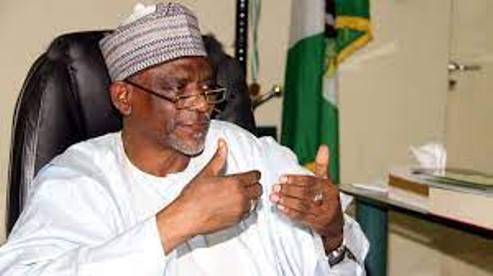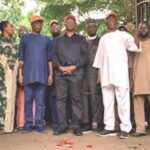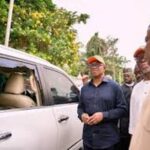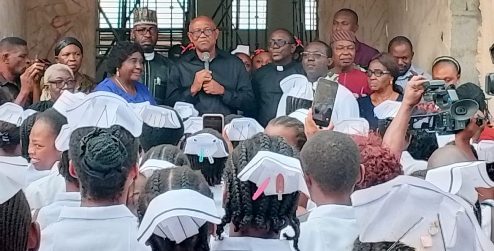
By Jerome-Mario Chijioke Utomi
LAGOS MARCH 3RD (NEWSRANGERS)-Among many other comments in the recent past, I heard some say that across the globe, funding education now comes with a crushing weight that government alone can no longer bear. To this group, it calls for private public-private partnership and support from good spirited individuals to the rescue. Within this span, I have equally read an argument that our educational system is faulty just like every educational system is faulty. The United State Educational system they added is faulty, if there is no fault in any system, then, there is no improvement. They concluded that what we call fault is a challenge and that is the basics of development. To the rest, our educational system is not faulty as it remains one of the systems that is still very sound and applauded across the world.
Regardless of what you hear or read on the pages of the newspaper, this piece believes that it has not been an easy road for the Nigerian education sector but a tough and tumble ride. Even the practice of democracy in the country, contrary to earlier beliefs, has not helped to stop the pangs of challenges experienced by Nigerians in the sector.
While it will not in any ways be characterized as hasty that here in Nigeria, there are more non-learners in school than out of school -particularly as the world is in agreement that schooling does not always lead to learning, but, with the ongoing one-month warning strike embarked upon by The Academic Staff Union of Universities (ASUU), to ensure the government stops reneging on agreements with the union, has more than anything else made it clear, that the nation’s public universities, principally the Federal Government-owned universities are in trouble.
Aside from the fact that this is the second industrial action in less than two years , coupled with the fact that the system continue to frustrate the ambitions and aspirations of our youths; those that will provide the future leadership needs of the country, there are indeed, reasons that characterizes the current happenings as a troubling reality.
The most fundamental of the reasons is that the strike came a few days after President Muhammadu Buhari, in Abuja while receiving members of the Nigeria Inter-Religious Council (NIREC) led by the Co-Chairs, the Sultan of Sokoto, Alhaji Muhammad Sa’ad Abubakar, and the President of the Christian Association of Nigeria, Revd. (Dr.) Samson Olasupo Ayokunle, promised that the Federal Government remains committed to honouring promises made to the Academic Staff Union of Universities (ASUU) to prevent disruptive strikes, engender uninterrupted academic programmes and improve funding of educational institutions.
The second stems from the words of Professor Emmanuel Osodeke, President, the Academic Staff Union of Universities (ASUU), who during a reported interview with the Channels Television, not only contradicted but proved as untrue the above pledge by Mr. President. He ‘religiously’ explained how the FG has seamlessly become reputed for not keeping to promises.
Let’s listen to him; “For the past nine years or so, they have been giving us promises but once the strike is over, they relapse. While noting that his colleagues are tired of these promises which they don’t fulfill’, he added that what they want is actions, maintaining that the union has sacrificed for the country’s educational system, concluding that ASUU will not back down on the current industrial action, since the Federal Government has become reputed for not keeping to its promises.
Looking above, it is evident that If the time-honored aphorism which considers education as the bedrock of development is anything to go by and if the age-long believe that; with sound educational institutions, a country is as good as made -as the institutions will turn out all rounded manpower to continue with the development of the society driven by well thought out ideas, policies, programmes, and projects remains a valid argument, then, we all have reasons not only to feel worried but collectively work hard to deliver the nation’s public universities from the valleys of the shadow of death.
Specifically, these challenge comes in two forms; the first lays out the dilemma posed by the government’s underfunding of the public universities which as a consequence; impedes lecturers from carrying out scholarly researches, truncates academic calendar with strike actions, lace Nigerian universities with dilapidated and overstretched learning facilities with the universities producing graduates devoid of linkage with the manpower demand by the nation’s industrial sector.
The second challenge stems from the first but centres more particularly on thoughtless demand for fees of varying amounts/ proposed by the school authorities-a development that is financially squeezing life out of the innocent students and their parents.
The dilemma and menace posed by this practice indicates a considerably higher risk. And except the government commits its resources in getting to the root of the challenge, the potential consequence could be higher than that of other challenges currently ravaging the education sector.
By not taking the education sector seriously, one fact that the Federal Government failed to remember is that when human beings, through sound education, develop a higher order of thinking, the society gains an advantage in being able to anticipate emerging threats, they gain the ability to conceptualize instead of just perceiving. But when they fail to acquire or deny the need, they will also gain the ability to conceptualize an imaginary threat and when a group of people are persuaded to conceptualize this imaginary threat, they can activite the fear response as powerfully as the real threat.
This fact partially explains the current fears and insecurity that have recently enveloped the country.
It is equally a sign of a government that has not yet come to terms with the fact that the traditional progressive solution to problem that involves a lack of participation by citizens in civic and democratic process is to re-double emphasis as education posses an extremely valuable strategy for solving many of the societal ills including insecurity.
To further avert all these, governments at all levels must unlearn this attitude of progressive non recognition of the right to education as a human right despite their membership of a number of international conventions, including the International Covenant on Economic, Social and Cultural Rights where the right is respected.
Above all, the President Muhammadu Buhari led Federal Government must urgently commit to mind that globally; ‘the relationship between employers/employees is always strained, always headed toward conflict. It is a natural conflict built into the system. Unions do not strike on a whim or use the strike to show off their strength. They look at strikes as costly and disturbing, especially for workers and their families. Strikes are called as last resort. And any government that fails to manage this delicate relationship profitably or fails to develop a cordial relationship with the workers becomes an enemy of not just the workers but that of the open society and, such society will sooner than later find itself degenerate into chaos.
Utomi Jerome-Mario is the Programme Coordinator (Media and Public Policy), Social and Economic Justice Advocacy (SEJA), A Lagos-Based Non Governmental Organization (NGO). And could be reached via Jeromeutomi@yahoo.com/08032725374.










